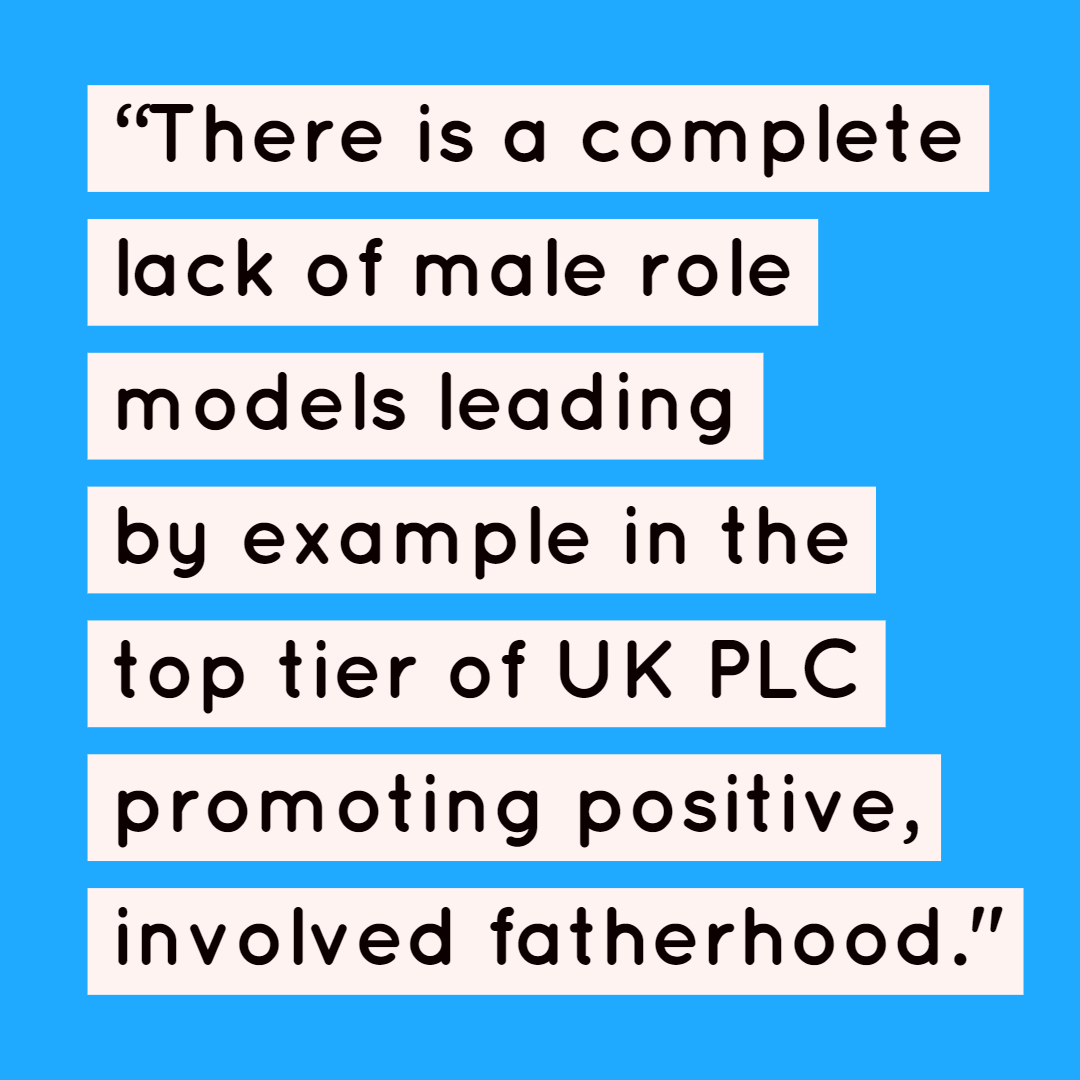I want you to think of the world of business and commerce. I’m not talking small and medium sized businesses, I mean big companies from UK PLC, those in the FTSE 100. I’m now going to set you a challenge. Can you name one male figure from the world of big business who has taken a period of shared parental leave following the birth or adoption of a child? You can’t? Me neither.

I think there is a lack of role models from the world of business. There’s much talk about employers being family friendly or enabling employees to strike a good work life balance.
Let’s play fair, some employers do indeed go out of their way to embrace and promote such policies and that should be celebrated (indeed, I’ve highlighted a few examples below). That said, has someone, anyone, from the most senior levels of a FTSE 100 company taken a spell of shared parental leave (SPL)? I went on a quest to find out.
The challenge I set myself
I contacted 10 FTSE 100 companies and asked a simple question. Had anyone, male or female, at board level exercised their right to take SPL since its introduction in 2015?
I contacted the following big beasts from UK PLC: 3i, Astra Zeneca, Next, Easyjet, Compass Group, WPP, Halma, Centrica, British Land and ITV. To get a bit of balance, I also approached a couple of non-FTSE organisations, namely professional services firm BDO LLP and, to get an example from a publicly funded body, the BBC.
What I expected to find
Considering the low take-up of SPL among the general workforce, I didn’t expect to discover many examples. I also didn’t expect to find numerous examples of men, or indeed women, at board level who had taken six, nine or even 12 months away from work on SPL to look after their kids.
I felt I was realistic. The odds on someone that senior taking months and months away from work were unlikely. They do, after all, shoulder a huge burden.
Nonetheless, I did have hope. A little candle-sized flame was burning inside me in the hope that someone, just maybe, might have taken six weeks or a couple of months SPL following the arrival of a child. Who knows, I may have got lucky and found someone, male or female, who had indeed spent months and months at home with baby. Nonetheless, I felt the former was more likely than the latter.
What I actually found
The response was mixed. I was simply ignored by a couple of organisations while a couple gave very woolly responses. A small number had very positive things to say and I will come on to that in a moment. Although there were some positive stories to tell, not one of the organisations I approached could identify a single board-level employee who had taken SPL.
A couple of organisations did state that they had small boards, largely made up of older people with teenaged kids so SPL was not relevant.
I was a little surprised by this. I thought company directors were like police officers and were getting younger every day. It seems I was mistaken and in the name of fairness, I must mention this.
Easyjet issued a statement saying: “We recognise the importance of balancing work and home life and so we have developed a suite of family friendly policies including one covering shared parental leave so our people know and understand how we can support them in every stage of their working life. There was some take up of this in 2018 including from within our pilot, cabin crew and head office functions.”
3i said simply that it had “good take up” of SPL across the organisation.
I took my findings to the Institute of Directors and asked if it would care to comment. At the time of writing, I’d had no response.

Examples of good practice
As I said above, while no organisation had been able to identify board-level staff who had taken SPL, there were some good examples out there and I have to single out British Land as one of them.
British Land was the only organisation to provide me with hard facts. The company has, give or take, about 230 staff. Following a suggestion from the company’s Women’s Network, it introduced an enhanced package of shared parental leave pay for men in 2017. Since then, 10 men have taken a spell of protracted period leave from work and a further three are expected to do so shortly.
The chief executive, Chris Grigg, also wrote this blog post back in 2018. In addition to making clear that British Land’s approach has led to better equality in the workplace, Grigg makes a pointed reference to shared parental leave “not being embraced by UK PLC.”
I have never worked at British Land. I can’t comment on what its working culture is genuinely like, but it is publicly saying the right things and considering the number of staff the firm employs, the take up of SPL seems healthy.
While not a FTSE company, BDO LLP gave me a wonderful case study. Simon Hall is a Director in the Corporate Finance Team. In terms of structure, that means he’s just beneath Partner (loosely speaking, a Partner would be the equivalent of being a board member in this kind of company).
Hall admitted he barely knew anything about SPL when he discovered he was going to become a dad. His human resources colleagues talked him through it, and he ended up taking a couple of weeks of paternity leave just after his wife gave birth and a larger block five months later.
Hall said: “This flexibility made a huge difference, as it meant I was able to support my wife at a point when our daughter, Jessica, was becoming more active and demanding! It gave my wife the chance to have the occasional break, the importance of which cannot be overlooked and significantly, it meant she could gradually phase herself back into running the family business. We also caught up with tonnes of ‘life admin’, which really piles up when you have a child!
“From a personal perspective, it also meant we could both be around for some really key milestones, like hearing Jessica’s first words, helping her wean onto solid foods, and taking her to meet her extended family for the first time, some of whom cannot travel, including her Great Grandma in Malaysia.”
The BBC, meanwhile, highlighted Jonathan Aspinwall. Aspinwall is deputy editor of the agenda-setting BBC Breakfast programme. He took a period of adoption leave when he and his husband adopted their children. While Aspinwall is not a BBC Board member, that’s still a very senior role.
What does this all mean?
I put my findings to the charity Working Families, an organisation that aims to promote better work life balance. Kirstie Axtens, its Head of Employer Services said:
“It is definitely time for senior executives to set a good example for employees, especially fathers, by publicly taking and talking about Shared Parental Leave. Policies alone don’t lead to culture change in organisations; a policy will only be seen as credible if the senior team ‘walks the walk’. If senior leaders don’t take SPL, line managers won’t feel obliged to support and encourage it, and there will be an unspoken feeling amongst employees that the company is not truly behind the policy.”
Axtens went on to say that a barrier to employees taking SPL was a lack of enhanced parental leave pay. This, she said, was an issue that companies should address (as British Land has).
I feel that Axtens has made some very valuable points. There is a complete lack of positive, male role models in the top tier of UK PLC promoting positive, involved fatherhood. Without these role models, managers won’t promote the policy to staff.
I hope that more organisations follow in the steps of British Land, BDO LLP and the BBC. I can think of dads from the world of the arts and sport who set great examples by being hands on and do so publicly.
Alas, the world of big business is lacking in this regard. There are no high-profile, role model dads from UK PLC who have stepped back from the workforce for a short while to help at home. It would be great to see someone at board level from these organisations take SPL. It may not have happened yet, but at least organisations like British Land, BDO LLP and the BBC are heading in the right direction. I just hope others follow in their wake.







4 thoughts on “Where are the positive fatherhood role models from UK PLC?”
Very interesting post and topic. Looking at the reasons given by the companies, I would have to believe that the lack of enhanced parental leave pay and the ages of these board members are the primary reason for the lack of take up. One other thing that might apply is whether they have a partner who works. Can people still claim SPL if their partner is a stay at home mum or dad without a maternity or paternity package?
You are right to question these issues Stuart. SPL does indeed require both partners to be working and age is another factor at play here. Someone else has also questioned the lack of enhanced parental leave pay. If a CEO has a child or two already, maybe at an independent school, can they afford to go on on SPL if they don’t receive enhanced parental leave pay? Probably not, although that shines a light on his (or her, remember I asked about men AND women) employer’s approach to SPL.
That said, I think the general unwillingness of the companies to address the issue publicly says a lot. I would strongly recommend following the link and reading the blog post written by British Land’s Chris Grigg. It shows the positive impact on an institution when it does take SPL seriously and he says himself UK PLC isn’t embracing SPL. This was a missed opportunity to send out a positive message for most of the companies involved. Even if none of the board members had taken SPL, they could have pointed out that they offered enhanced pay, that senior managers often took the leave and that female talent retention had improved since the introduction instead. Instead most of those approached chose to hide behind woolly statements issued by their media offices.
Fantastic post! I look fwd to reading more.
Delighted you enjoyed it Kris. Do come back and visit the blog again.